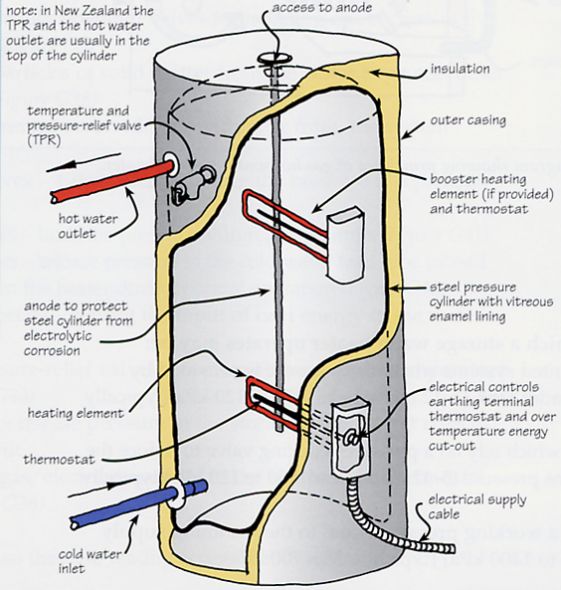What is an electric hot water heater?
How do electric hot water heaters work?
What are the differences between hot water heaters available?
Most of us don’t give a passing thought to how our water is heated as long as it is hot when we turn on the hot water tap or get in the shower. There are various ways our water can be heated and these generally are by Gas, Heat Pump, Solar, Wetback or Power (Electricity).
An electric powered water heater can be referred to by many names – a hot water storage tank, a hot water tank, thermal storage tank, hot water thermal storage unit, heat storage tank or a hot water cylinder.
Electric hot water cylinders are the most common form of water heating in New Zealand.
The cylinders use an electric element in an insulated tank to heat the water to a temperature set by a thermostat.
It acts a bit like a hot water jug or kettle. It has an immersion element inside the cylinder (which looks like a metal loop or coil) and it heats the surrounding water.
The cylinder is an insulated water tank with a cold tube to carry water in, and a hot tube to send the water where it’s needed inside the home. The heating is controlled by a thermostat that turns on the heating element when the water goes beneath the pre-set temperature.
When the heating element is on, electric power runs through it, creating heat. Unlike a gas water heater, the heat does not go through a heat exchanger. Instead, it flows directly into the tank’s water supply.
Electric water heaters (with an immersion element) are more energy efficient than gas water heaters. A conventional electric model averages a 90 percent efficiency rating, while a conventional gas water heater averages a 60 percent rating. Electric power is generally more expensive than natural gas.
Gas does outperform the electric model in water heating speed and recovery time. A gas heater can heat around 190 litres in roughly an hour, while an electric heater takes several hours to heat the same volume.
Some other benefits to electric hot water heaters are that out of all the various types of water heating products available, they have the lowest upfront cost.
They also have a certain amount of flexibility. You can buy cylinders with additional connections suitable for having a solar water heater, heat pump water heater or wetback added in the future. This allows you to change the way you use your hot water, and for adaptation should your family size grow or the demands you require on hot water change.
You can purchase an electric hot water heater that has a thermostatic control. This means that it will automatically turn off when it reaches the temperature you set on the thermostat. This will save you money over time.
If you have a boiler system in your home, an electric water heater will not be connected to your boiler. This means that if your boiler breaks down, you can still generate hot water for your home.
If you well insulate your electric water heater, it can keep water hot for several hours after it switches off. You can set a timer on your heater so that it only switches on during cheaper off-peak electricity hours.
You can usually turn your electric water heater on or off by simply flicking the switch on the wall socket. This is a great power savings ability especially useful if you are going away on holiday and you will have no need for hot water in the house while you are away.
And what kind of things should you be aware of regarding an electric hot water heater?
- Heating water using electricity is more expensive than heating water with say, gas. A typical electric water heater uses 3 kilowatts of electricity an hour, so it will cost the average house about 78c an hour to run. Most households will need to run an electric water heater for at least a couple of hours a day to get the water hot enough – costing at least $560 a year.
- An electric water heater needs a thermostatic control, otherwise it can heat the water to far too high a temperature.
- Some heating engineers may recommend you leave your electric water heater on 24/7 – however, this can be very expensive unless it has a thermostatic control.
- Be aware that you need to heat the water in your electric water heater to above 50°C to kill off bacteria.Above all consider all of your options. What works for one household might not be the best option for yours. Getting the sizing, the placement and the installation right is important for obtaining your long term enjoyment from your new water heater.









